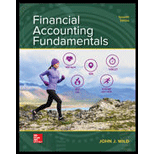
Concept explainers
Asset: It refers to all valuable items that a company owns or items that generate some income to the company whether tangible or intangible. The more assets a company owns, the stable its financial position would be.
Accounting rule for assets is,
- Increase in assets is always debited
- Decrease in assets is always credited.
Liability: It refers to all items that have some monetary value in market and that company owes from others. The liability is much important for a company for financial support.
Accounting rule for liabilities is,
- Increase in liabilities is always credited.
- Decrease in assets is always credited.
Equity: It refers to the contribution that an owner makes to the company. The more equity the company has, the more profitable the company would be.
Accounting rule for equity is,
- Increase in Equity is always credited.
- Decrease in equity is always debited.
To classify: Items into asset (A) account, liability (L) account and equity (EQ) account.
Want to see the full answer?
Check out a sample textbook solution
Chapter 2 Solutions
FINANCIAL ACCT.FUND.(LOOSELEAF)
- What are two double entries the following transaction? Account Receivable. Account payable. Rent Expenses. Cell phone bill, cable, light bill, gas, and monthly income of $4,000.00 what will be your net income after all expenses are paid. Please figure out your own price for each expense.arrow_forwardCan you solve this general accounting problem using appropriate accounting principles?arrow_forwardCan you help me solve this general accounting question using the correct accounting procedures?arrow_forward
- I need the correct answer to this general accounting problem using the standard accounting approach.arrow_forwardI need help solving this general accounting question with the proper methodology.arrow_forwardI need the correct answer to this general accounting problem using the standard accounting approach.arrow_forward
- Can you solve this general accounting question with the appropriate accounting analysis techniques?arrow_forwardPlease explain the solution to this general accounting problem with accurate principles.arrow_forwardPlease explain the solution to this general accounting problem with accurate principles.arrow_forward
- Principles of Accounting Volume 1AccountingISBN:9781947172685Author:OpenStaxPublisher:OpenStax College
 College Accounting, Chapters 1-27AccountingISBN:9781337794756Author:HEINTZ, James A.Publisher:Cengage Learning,
College Accounting, Chapters 1-27AccountingISBN:9781337794756Author:HEINTZ, James A.Publisher:Cengage Learning, Intermediate Accounting: Reporting And AnalysisAccountingISBN:9781337788281Author:James M. Wahlen, Jefferson P. Jones, Donald PagachPublisher:Cengage Learning
Intermediate Accounting: Reporting And AnalysisAccountingISBN:9781337788281Author:James M. Wahlen, Jefferson P. Jones, Donald PagachPublisher:Cengage Learning



